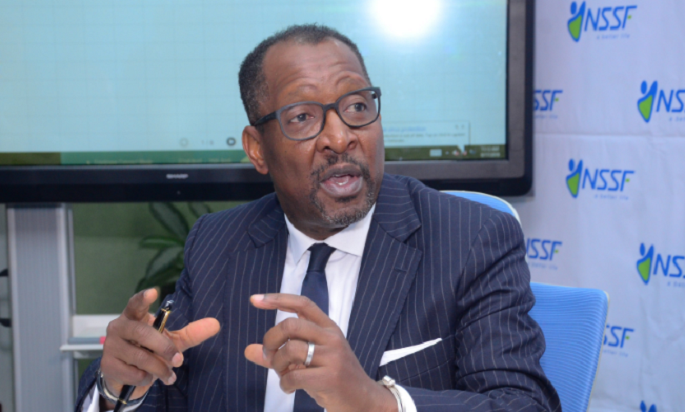Richard Byarugaba
Former National Social Security Fund Managing Director, Richard Byarugaba should refund about 2.6 billion shillings lost under his tenure or face prosecution. That is part of the recommendations by the Inspectorate of Government(IGG) in a just-released report into alleged mismanagement of worker’s money.
The investigation, initiated at the beginning of the year, examined over 15 allegations of abuse of office, corruption, and mismanagement of the fund by Byarugaba, the NSSF board members, and other top officials.
The 61-page investigation summary report revealed that Byarugaba is required to refund various sums of money, mainly related to irregular payments to NSSF staff members who voluntarily left their positions and payments made to resigning board members.
The IGG also wants Byarugaba and other officials at the Fund to reimburse money advanced to them for trips they did not fully cover. They are said to have spent fewer days than they should have as per the money advanced to them in per diems.
Byarugaba and Stevens Mwanje, the head of finance are singled out for making irregular payments to staff members who exited through the voluntary early retirement program. NSSF is said to have lost over 4.4 billion shillings under that scheme.
“Mr. Richard Byarugaba and Mr. Stevens Mwanje should refund…in equal installments for the loss occasioned to the Fund when they authorized irregular payments to staff who exited under the voluntary early retirement program within a period of six months,” the report reads in part.
The said schemes came into place following the recent amendment of the NSSF Act. According to the report, there was a change in the staff structure resulting into a reduction in staff. At the NSSF Executive Committee meeting on April 20, 2022, it was acknowledged that the reorganization led to voluntary departures and various compensation packages were prepared for the departing staff.
The packages included a three-month gross payment, standard severance pay (equivalent to one month’s salary per year worked), and an additional bonus (equal to one and a half months’ pay per year worked). Individuals under that category would receive a total salary of two and a half months for each year worked.
“The entire exit package was not backed by any law in Uganda. The packages were outside the provisions of both Section 87 of the Employment Act and Section 23.12 of the NSSF Human Resources Policy Manual, 2017… It was negligent, irregular, and wasteful to pay the exiting employees exorbitant amounts of money that were not due to them.,” said the report.
The report also faulted Byarugaba and Mwanje on another irregular payment of 687,257,226 to Fred Bamwesigye then employers’ representative and Julius Bahemuka then workers’ representative who both exited the NSSF Board in February 2022 to pave the way for the appointment of female Board members in line with the new amendments.
“The Act does not provide for any compensation for a Board member who is either removed or resigns from office. It was therefore irregular to compensate the Board members. Since all the Board members declared a conflict of interest in the meeting where the exit package was discussed, Mr. Richard Byarugaba and Mr. Stevens Mwanje (CFO) are therefore responsible for the arbitrary payments to Mr. Fred Bamwesigye and Julius Bahemuka,” the report added.
Byarugaba was however absolved of allegations that he used the budget to siphon funds from the NSSF through excessive spending on foreign trips. According to the IGG, there was no evidence to support those claims.
It was however discovered that participants on these trips often spent fewer days than what had been paid for. As a result, Byarugaba was instructed to refund over 16.5 million shillings for the trips where he spent fewer days in 2019 and 2022.
The Inspector General of Government (IGG) ordered other officers, including Gerald Kasaato, Muhammad Kasumba, Ibrahim Buya, and Owera Kenneth to reimburse a total of over 25.9 million shillings in relation to the trips. The report also highlighted that there was often insufficient justification for the presence of such a large delegation on many of the trips.
“The NSSF management should adopt a system where staff requesting for funds for foreign trips where the activity dates are not specified, attach activity plans to their requisitions justifying the number of days requested for and indicating what they intend to accomplish. Before approval of request for funds, the approving authority should review the activity plan and the justification. for the benchmarking visit,” the IG recommended.
The Inspector General of Government (IGG), Betty Kamya said Byarugaba and Mwanje are obligated to reimburse the 2.6 billion shillings as well as any other amounts recommended for refund in the report. Kamya added that failure to comply with the refund will lead to prosecution.
Normally, the Inspector General of the Government allows the implicated public officer 60 to 90 days to refund the money after the investigation report is completed. However, an official from the Inspector General’s office informed URN that they have not yet specified a particular timeline for Byarugaba to repay the funds.
“Now that the report is out, the IGG will write to the implicated officers showing and ordering them on how to move forward, and in that letter, they will be told when to repay the funds,” the official noted.
Meanwhile, Byarugaba was cleared of various other allegations, including abuse of office and corruption. There had been claims that Byarugaba had inflated a budget of 4 billion shillings for the purchase of land at Nakigalala. However, the investigations concluded that this allegation was unfounded and not true.
“The estimated cost of Nakigalala land in the FY 2022/23 budget remained UGX 250 Billion as it was in the budget of FY 2019/20 to 2021/22 and not 400 Billion as alleged,” the report added before it recommended to NSSF to suspend any ongoing procedures related to the acquisition of land at Nakigalala until the ownership disputes concerning the land are fully resolved.
Regarding NSSF’s 10 percent contribution to eight board members who were not employees of the NSSF, the investigators found this was irregular and recommended that NSSF initiates a process of recovering the irregular contributions totaling over one hundred an three million shillings (103,481,752)
The report recommends that NSSF should immediately cease making standard member contributions to board members since they are not employees of the Fund. The report discovered irregularities in the payment of member benefits over the past three and a half financial years. The investigations revealed that NSSF had fraudulently paid out 3.94 billion shillings to 36 members as exempted employment benefits.
The IGG has recommended the prosecution of ten individuals who accessed their benefits from NSSF through fraudulent means. Those individuals are said to have lied that they had joined the public service when they had not. Individuals employed by the Public Services are not supposed to make contributions to NSSF.
“(They)should be prosecuted by the Office of the Director of Public Prosecutions (ODPP) for false pretenses and uttering false documents against NSSF, contrary to Sections 304 and 351 of the Penal Code Act (Cap 120),” the report added.
The report suggested administrative measures aimed at improving the management of the fund. It asks the NSSF management to adopt a frugal approach and reduce expenses. The saving according to the report would increase the interest paid to members by at least one percentage point.
The report also recommends an amendment to relevant legislation to stipulate that Board members must possess specific academic qualifications, relevant experience, and skills that align with the core business of the Fund.
The Minister of Gender, Labour, and Social Development was advised to submit Section 35(1) of the NSSF Act to Parliament for amendment.
The IGG suggests that the computation of members’ interests should be based on the closing balance instead of the opening balance for a financial year. That according to the report will ensure a more accurate and fair calculation of member’s interests, aligning it with the fund’s financial performance throughout the year.
Investigations on NSSF by the parliament and IGG originated from allegations of corruption and mishandling of the Shs 17.9 trillion Fund, as well as the controversies surrounding the reappointment of Richard Byarugaba as the managing director. Byarugaba had reached the mandatory retirement age of 60 years.
In November 2022, Dr. Peter Kimbowa, the chairperson of the NSSF board had recommended to Gender and Labor Minister, Betty Amongi to have Byarugaba reappointed. Kimbowa justified this based on the fund’s growth over 12 years, resulting in a balance sheet size of Shs 17 trillion. The board argued that reappointing Byarugaba would address management gaps that could jeopardize the workers’ funds.
However, Minister Betty Amongi postponed the reappointment, citing various concerns such as corruption, collusion with contractors, indiscipline, and allegations raised by Gen Salim Saleh during a meeting with NSSF’s top officials at Kapeeka on June 12, 2022.
Earlier, Byarugaba and Amongi had fallen out when the Byarugaba reportedly refused to budget 6 billion shillings for the minister’s planned activities related to supporting NSSF in terms of employer contribution compliance and contribution enhancement.
In the IGG’s report, it was found that, despite Byarugaba’s refusal, the amended law explicitly granted the Minister the authority to approve or disapprove the budget.
Polly Muhairwe, the Director of Special Investigation at the IGG’s office told URN that to prevent potential misuse of that power in the future, they recommended the creation of regulations to operationalize Section 29 of the NSSF Act. The proposed regulations would establish clearer guidelines and parameters for the Minister’s decision-making process, ensuring transparency, accountability, and a fair approach.
-URN





